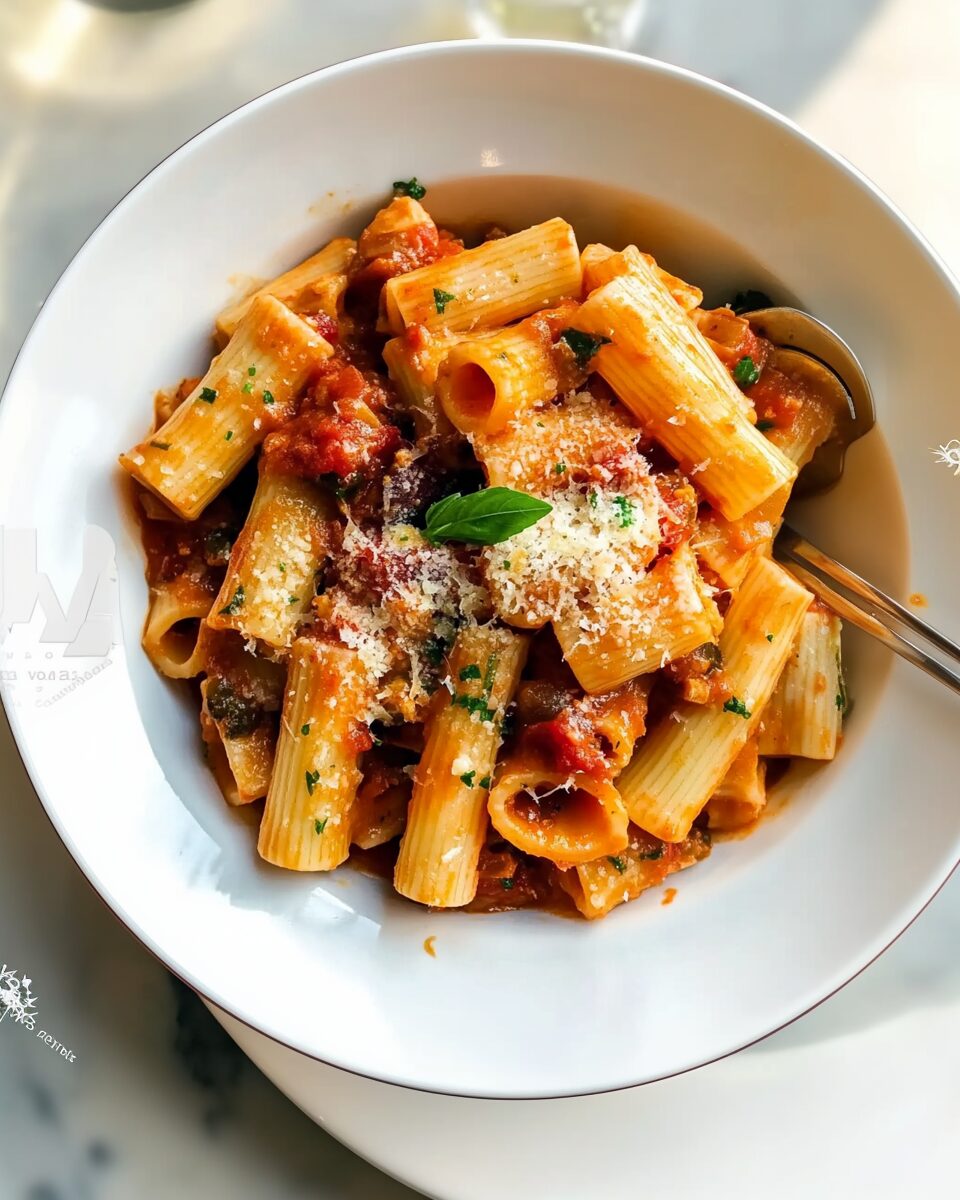Pasta alla Norma is a classic Sicilian dish that combines tender roasted eggplant with rich marinara sauce and fresh basil, all tossed with pasta for a hearty and flavorful meal. Unlike traditional methods that fry the eggplant, this recipe opts for roasting, resulting in a lighter yet equally satisfying dish. It’s an excellent choice for a vegetarian dinner that doesn’t skimp on taste or texture.
Full Recipe:
Ingredients
-
1 batch Super Simple Marinara Sauce, or 2 cups (16 ounces) store-bought marinara
-
2 medium eggplants (about 2 ¼ pounds total)
-
¼ cup + 1 teaspoon extra-virgin olive oil
-
¼ teaspoon fine salt, more to taste
-
8 ounces rigatoni, ziti, or spaghetti
-
½ cup chopped fresh basil, plus additional small or torn leaves for garnish
-
½ to 1 teaspoon red pepper flakes, to taste (optional)
-
½ teaspoon dried oregano
-
¾ cup (1.5 ounces) finely grated ricotta salata and/or Parmesan cheese
Directions
-
If preparing homemade marinara sauce, cook it according to the recipe instructions. Once done, keep it warm over low heat. If using store-bought marinara, warm it in a pot over medium-low heat while you proceed with the next steps.
-
Preheat the oven to 425°F (220°C) with racks positioned in the upper and lower thirds. Line two large, rimmed baking sheets with parchment paper for easy cleanup.
-
Using a vegetable peeler, shave off long alternating strips of eggplant peel to create a striped appearance. Slice the eggplants into ½-inch thick rounds, discarding the end pieces.
-
Arrange the eggplant slices on the prepared baking sheets. Brush both sides of each slice with olive oil and season with salt and pepper. Roast in the oven until deeply golden and tender, about 35 to 45 minutes, flipping the slices after 20 minutes. Once done, set aside.
-
Bring a large pot of salted water to a boil. Cook the pasta until al dente according to package instructions. Before draining, reserve about ½ cup of the pasta cooking water. Drain the pasta and return it to the pot.
-
Gently stir the roasted eggplant into the warm marinara sauce. Add the remaining teaspoon of olive oil, chopped fresh basil, red pepper flakes (adjust to your spice preference), and crushed dried oregano.
-
Combine the pasta with the eggplant-marinara mixture, adding a couple of tablespoons of the reserved pasta cooking water to help the sauce adhere. Stir in about two-thirds of the grated cheese, reserving the rest for garnish. Adjust seasoning with additional salt and pepper as needed. If the sauce appears too thick, add more pasta cooking water to reach the desired consistency.
-
Divide the pasta among four serving bowls. Sprinkle the remaining cheese and additional fresh basil leaves on top. For added richness, drizzle each serving lightly with olive oil. Enjoy! Leftovers can be stored in the refrigerator, covered, for 4 to 5 days.
Nutritional Information
Per serving (based on 4 servings):
-
Calories: Approximately 450 kcal
-
Protein: 15g
-
Carbohydrates: 65g
-
Dietary Fiber: 10g
-
Sugars: 15g
-
Fat: 15g
-
Saturated Fat: 3g
-
Cholesterol: 10mg
-
Sodium: 400mg
-
Potassium: 800mg
-
Vitamin A: 15% DV
-
Vitamin C: 20% DV
-
Calcium: 20% DV
-
Iron: 15% DV
Origins of Pasta alla Norma
The roots of Pasta alla Norma can be traced back to the late 19th century in the city of Catania, located on the eastern coast of Sicily. The dish was named in honor of Vincenzo Bellini’s famous opera “Norma,” a work that was particularly revered in Catania. Legend has it that the dish was first created by a local chef who was inspired by the grandeur of the opera and sought to craft a meal that matched its elegance. According to some accounts, when the dish was first presented to a renowned Catania-based food critic, he exclaimed that it was “as great as the opera”—thus giving the dish its enduring name, Pasta alla Norma.
Although Pasta alla Norma has evolved over the years, it remains a tribute to the rich culinary heritage of Sicily. The dish embodies the essence of Sicilian cooking, with its bold flavors, use of locally sourced ingredients, and Mediterranean influences. The popularity of the dish grew steadily throughout the 20th century, and today it is widely regarded as one of the quintessential dishes of Sicilian cuisine.
What Makes Pasta alla Norma So Special?
Pasta alla Norma is celebrated for its harmonious balance of flavors and textures. The star of the dish is undoubtedly the eggplant, which is traditionally roasted to perfection. The eggplant provides a meaty texture and a rich, smoky flavor that perfectly complements the tangy marinara sauce. The sauce itself, which can either be homemade or store-bought, is infused with the boldness of tomatoes, garlic, and basil, giving it a fresh and robust taste. The final touch is the addition of ricotta salata, a firm and slightly salty cheese that brings an extra layer of depth to the dish.
One of the most appealing aspects of Pasta alla Norma is its versatility. The recipe can be adapted to suit different tastes and dietary preferences. While the traditional recipe calls for pasta, eggplant, marinara sauce, and ricotta salata, many variations of the dish exist. Some cooks might add a sprinkle of Parmesan cheese, while others may opt for a sprinkle of red pepper flakes to add a touch of heat. No matter how you make it, the result is always a flavorful, comforting meal.
Key Ingredients in Pasta alla Norma
The magic of Pasta alla Norma lies in its simplicity. The dish requires just a handful of ingredients, but each one plays a vital role in creating the delicious end product. The primary ingredients include pasta, eggplant, marinara sauce, fresh basil, and ricotta salata or Parmesan cheese. The choice of pasta is flexible, with traditional recipes calling for rigatoni or ziti, but spaghetti or other pasta shapes can also be used.
Eggplant is arguably the most crucial ingredient in the dish. When properly prepared, it offers a rich, savory flavor that pairs wonderfully with the other components of the dish. The eggplant is typically roasted, which helps bring out its natural sweetness while imparting a smoky flavor. In some variations, the eggplant may be fried, but roasting is a healthier and equally delicious option.
Marinara sauce forms the base of the dish, and it should be made with high-quality tomatoes. The sauce is often prepared with garlic, olive oil, and fresh basil, adding depth and fragrance to the dish. The richness of the sauce enhances the flavor of the roasted eggplant, and together, they create a satisfying and wholesome meal.
The final touch is the cheese, with ricotta salata being the most traditional choice. Ricotta salata is a firm, salted version of ricotta cheese that crumbles easily and adds a burst of flavor to the dish. Parmesan cheese can also be used as an alternative, or in addition to, ricotta salata for an extra layer of savory goodness.
The Preparation of Pasta alla Norma
The preparation of Pasta alla Norma is relatively straightforward, and the result is well worth the effort. The first step involves roasting the eggplant, which is typically sliced into rounds or cubes. The eggplant is then brushed with olive oil, seasoned with salt and pepper, and roasted in the oven until golden and tender. Roasting the eggplant brings out its natural sweetness while creating a deliciously smoky flavor that complements the tangy marinara sauce.
While the eggplant is roasting, the pasta is cooked in a large pot of salted water. It’s essential to cook the pasta until it is al dente, as this ensures that it holds its shape and texture when combined with the sauce. Once the pasta is cooked, it is tossed with the warm marinara sauce and roasted eggplant, ensuring that every piece is well-coated with the flavorful sauce.
The final step involves adding fresh basil and a generous amount of grated ricotta salata or Parmesan cheese to the pasta. The dish can be served immediately, garnished with additional basil leaves and a drizzle of olive oil for extra richness.
Cultural Significance of Pasta alla Norma
Pasta alla Norma is more than just a delicious dish; it is a cultural symbol of Sicily’s rich culinary heritage. The dish embodies the island’s love for fresh, locally sourced ingredients and its deep-rooted connection to the Mediterranean diet. The use of eggplant, tomatoes, and olive oil reflects the agricultural bounty of the region, while the emphasis on simplicity and bold flavors mirrors the island’s history and traditions.
In addition to its culinary significance, Pasta alla Norma also holds a special place in Sicilian identity. The dish is often prepared for family gatherings, celebrations, and festive occasions, making it a symbol of hospitality and tradition. Whether served in a bustling family kitchen or at a restaurant overlooking the Mediterranean Sea, Pasta alla Norma brings people together over a shared love of food.
Pasta alla Norma Around the World
While Pasta alla Norma is deeply rooted in Sicilian culture, its popularity has spread far beyond the shores of Italy. The dish is now enjoyed by food lovers around the world, and it has become a staple in many Italian restaurants. In fact, Pasta alla Norma is so beloved that it is often featured on restaurant menus as a representation of authentic Italian cuisine.
In countries outside of Italy, Pasta alla Norma has been adapted to suit local tastes and ingredients. In some places, the dish is made with different types of pasta or garnished with various cheeses. While these variations may differ from the traditional recipe, they all retain the essence of what makes Pasta alla Norma so special: a balance of fresh ingredients, bold flavors, and simplicity.
Health Benefits of Pasta alla Norma
Despite its indulgent flavors, Pasta alla Norma can be part of a healthy and balanced diet when prepared with care. The dish is rich in vegetables, with the eggplant providing a good source of dietary fiber, antioxidants, and vitamins such as Vitamin C and Vitamin K. Tomatoes, the base of the marinara sauce, are also packed with nutrients, including Vitamin A, Vitamin C, and potassium. Additionally, the dish can be made lighter by roasting the eggplant instead of frying it, reducing the amount of oil used.
For those looking to make Pasta alla Norma even healthier, there are several ways to modify the recipe. You can use whole wheat or gluten-free pasta for a fiber boost, and opt for reduced-fat cheese or omit the cheese altogether for a lower-calorie version. The dish is naturally vegetarian, and it can also be made vegan by swapping out the cheese for a plant-based alternative.
Conclusion
Pasta alla Norma is a timeless classic that beautifully showcases the flavors and traditions of Sicily. With its combination of roasted eggplant, marinara sauce, and savory cheese, this dish is a true celebration of Mediterranean cuisine. Whether you’re enjoying it as a comforting dinner at home or serving it at a special gathering, Pasta alla Norma is sure to impress with its bold flavors and rich history.






